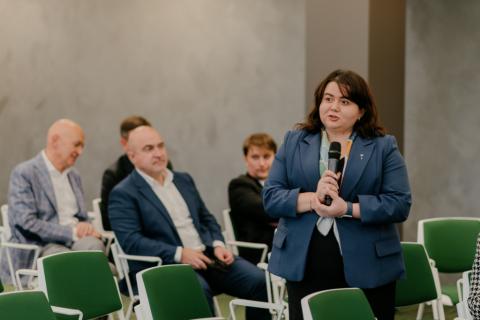The Ministry of Finance jointly with the EU High Level Advisers’ Mission launches an awareness raising campaign on the new tax and customs policy, which started yesterday with a dialogue with the business community. The purpose of the event was to explain the new fiscal measures before their entry into force, in order to prepare the business environment for upcoming innovations and potential challenges.
In the beginning of the event, State Secretary of the Ministry of Finance Cristina Ixari noted the importance of an open dialogue between state authorities and the business environment, emphasizing that this type of interaction not only improves transparency, but also contributes to the formulation of more effective fiscal policies adapted to current economic realities. The official also encouraged companies to express their concerns and suggestions, assuring them that the authorities are open to proposals that can support the national economy and facilitate the activity of compliant economic operators.
The EU High Adviser on Customs and Tax Policy, Rosario De Blasio, emphasized the crucial role of cooperation among all stakeholders involved in the process of elaboration and consultation of this important policy document. “In order to efficiently respond to all possible challenges in this process and advance in the transposition of EU legislation, we need joint coordinated efforts and awareness of the fact that every ingredient matters in this complex exercise.”
During the event, specialists of the Ministry of Finance, State Tax Service and Customs Service, involved in the elaboration and consultation process of the new tax and customs policy presented the main facilities introduced both for legal entities and for natural persons. Key speakers noted that in addition to supporting individuals with low income by introducing a 10% increase in personal exemptions, the policy also expands the sources of non-taxable incomes (including those from state securities and bonds) as to incentivizing certain sectors such as renewable energy, education, etc.
Discussions also focused on new measures introduced to support economic development, such as: revision of transfer pricing provisions, introduction of the new long-term employment stimulation tool – stock option plan, granting the right to apply the accelerated depreciation method for all legal entities; as well as on aspects of the harmonization of national legislation to EU directives. The participants had the opportunity to ask questions and express their opinions regarding the measures presented, thus contributing to a constructive dialogue, which is necessary to develop fair and competitive long-term policies.
The customs and tax policy for 2025 was elaborated by the Ministry of Finance, with the support of the EU High-Level Advisers’ Mission, and underwent a complex consultation process with representatives of the business environment, trade associations, central and local public authorities, around 300 proposals being examined in all.
The business dialogue is the first event of the awareness-raising campaign on the tax and customs policy for 2025, which will continue in November and December with thematic workshops, where public institutions and the private sector will collaborate in working groups to identify solutions for the effective implementation of legislative changes and promote constructive dialogue between stakeholders.









































